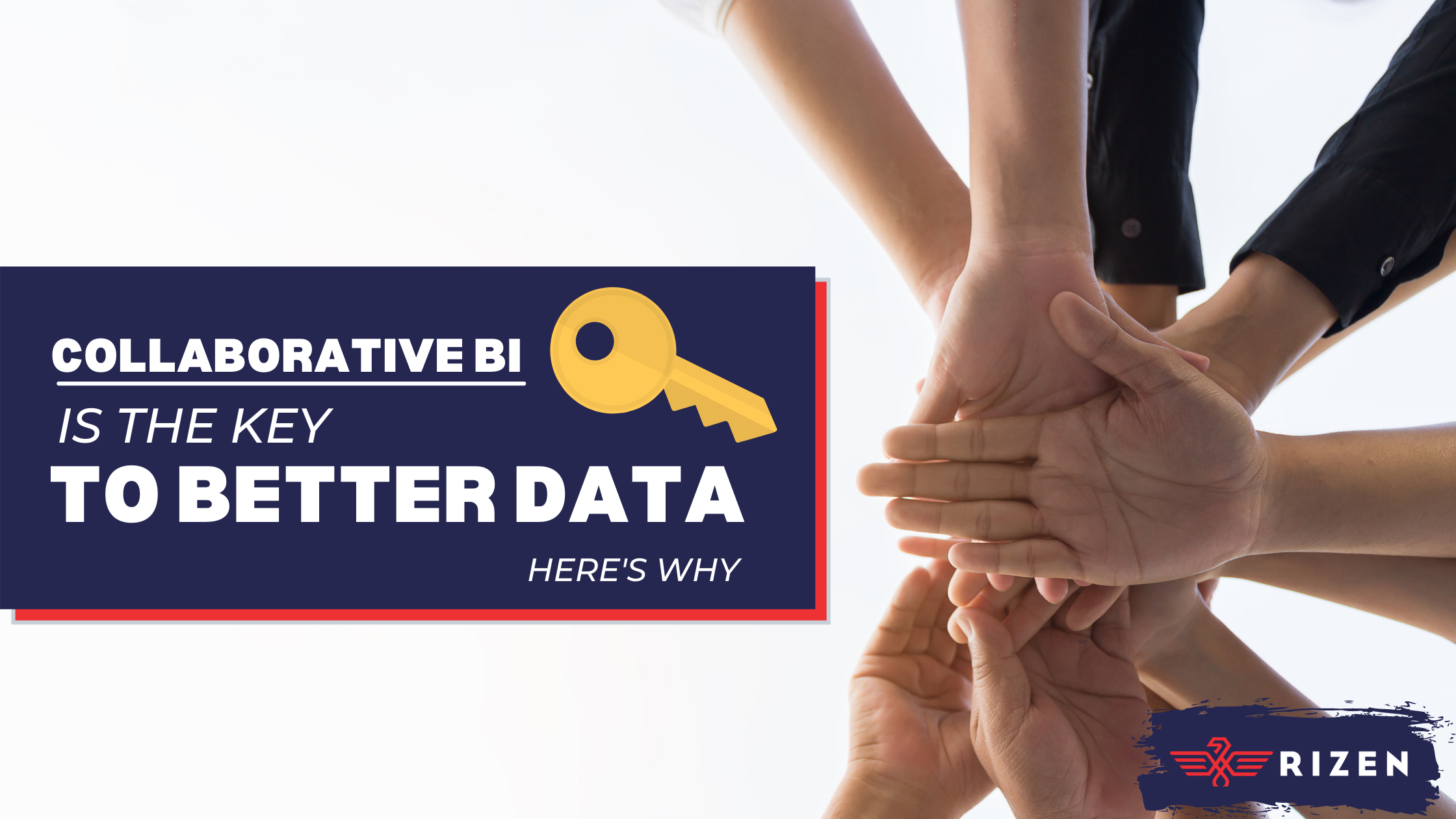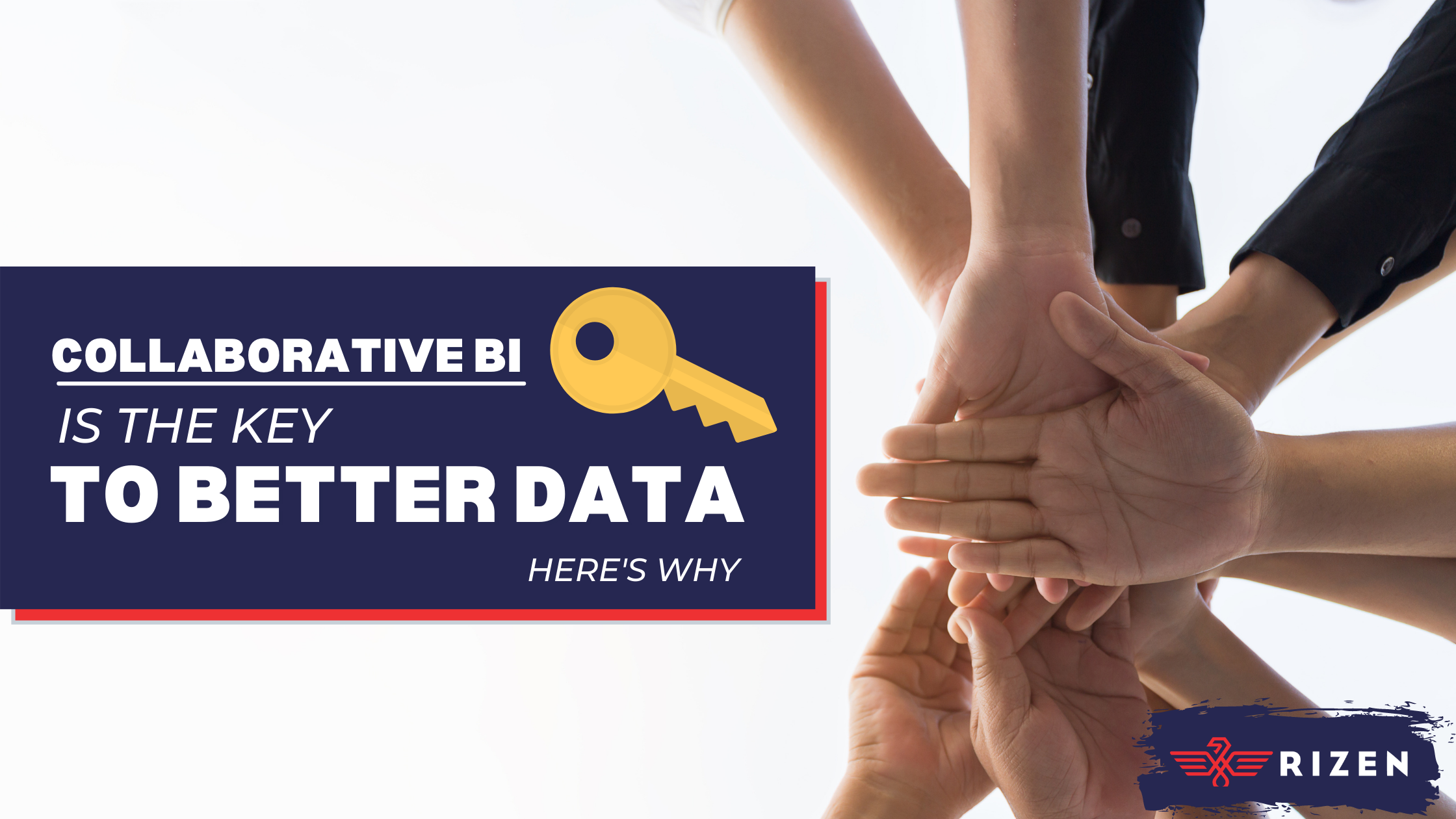
Gathering data, analyzing your actions' impact, and optimizing your business are all part of using business intelligence efficiently. It's a better way to manage your organization and figure out what's working and where you need to adjust.
Even the name - Business Intelligence – sounds smart. So, why is it that 70-80% of BI initiatives end up in failure?
There can be several reasons why business intelligence initiatives don't produce the desired results. The two most significant are a lack of collaboration and not using the right business intelligence software.
Isn't it amazing in business how often it comes down to having the right tools in place and our ability to communicate? That's why collaborative business intelligence is so important.
Learn More About Smart Data Reporting:
- Effective Data Reporting Requires Storytelling. Here’s Where to Start.
- Data Worth Tracking for Top-of-Funnel Audiences
- Data Worth Tracking for Middle-of-Funnel Audiences
- 5 Data Visualization Tools Worth Your Time (and Money)
 What is Collaborative BI?
What is Collaborative BI?
Collaborative business intelligence is the merging of traditional BI with collaboration tools. It enables people across the organization to see the data – in a form they can understand. This strategy helps create greater alignment within an organization and fosters the communication that's often missing.
It allows data to travel outside data analysts and provides greater visibility and accessibility for everyone involved in the decision-making process.
For example, collaborative BI helps content development at every phase of the customer journey. As you work to Attract, Engage, and Delight customers, it requires tight alignment between marketing, sales, financial, operations, and other key stakeholders. This alignment of resources is often the missing ingredient in the recipe for success for organizations.
It's essential when you're creating content for the middle of the funnel as you try to convince prospects to take the next step. A collaborative BI approach will play a significant role in your conversion rates at each stage using data analytics in your decision-making process.
 Why Traditional BI Doesn't Work Anymore
Why Traditional BI Doesn't Work Anymore
If you're not a data scientist, data analyst, or engineer, traditional BI can be complicated and difficult to understand. For marketers, that's means relying on others to slice and dice the data and interpret the results. It's tough to rely on others to analyze when your job depends on how well your marketing performs.
Traditional BI also tends to be presented as a report. These become static snapshots in time rather than a real-time look at what's happening right now. When you've built a marketing stack to customize and personalize your approach, you need real-time data to measure the impact. Business intelligence too often reports on what happened rather than what's happening.
Another reason traditional BI doesn't work anymore is that it's often presented as pure data. To be effective, you've got to apply the data, put it in context, and tell a story that resonates with your audience. One of the biggest challenges for marketers is trying to get the boss to understand your marketing efforts. After all, it's not the presentation of data that's important but the actions needed to move the organization in the right direction.
These things just don't happen without collaborative BI to help you shape the story and let others join the conversation. Otherwise, traditional BI can create more information siloes.
 The Benefits of Collaborative Business Intelligence
The Benefits of Collaborative Business Intelligence
This isn't to say traditional business intelligence isn't essential. It is. You've got to have a way to measure and track the numerous sources to create the underlying data you need. However, BI on its own isn't going to get you where you need to go. It takes a collaborative BI approach to create the actions you need to move your organization forward.
Making the data available to everyone in a form they can digest reduces the misinterpretation that can cause errors. Data visualization can help tell the story. Being able to dive into data points can help various stakeholders satisfy their curiosity. Collaboration tools can bring it all together to create the action plan.
Collaborative business intelligence software can help you turn BI data into strategy.
Collaborative BI will enable:
- Knowledge sharing
- Goal alignment
- Faster decision-making
- Better communication
- Better teamwork
One of the key lessons from the pandemic was the increased emphasis on agility. Companies that were able to pivot quickly were more successful. Collaborative BI is an essential tool to enable the kind of collaborative approach it takes to be agile. As the environment changed throughout 2020, it likely meant revising the strategy multiple times. The ability to see real-time data on these pivot points and make faster decisions.
 As the speed of business continues to increase, companies need to move at digital speed. This takes brief analysis and quick decisions.
As the speed of business continues to increase, companies need to move at digital speed. This takes brief analysis and quick decisions.
Leading businesses operate faster than their peers. For example, they are more than four times faster than their peers at reallocating talent and capital. They're able to this because they're confident in their ability to gather, sort, share, and collaborate on data.
Collaborative BI also reduces information siloes and reliance on data analysts for core functions that impact your job. The best collaborative business intelligence software will let you view what's happening in real-time so you can quickly evaluate the impact of your actions and share the information with your team.
Conclusion
Data alone isn't the answer to making smart business decisions. It's the ability to interpret and correlate the data that makes the difference. Collaborative business intelligence allows everyone in the decision chain to see things from their distinct viewpoint.
This transparency and visibility allow everyone to collaborate and share their insights that add up to better decision-making.




.gif?length=600&name=Data%20Bottom%20of%20funnel%20hero%20(1).gif)


No Comments Yet
Let us know what you think